Everyone is looking for foods to improve their gut health and gut health has become a popular topic in the world of nutrition—and for good reason. The gut has a strong influence on overall well-being, from digestion and immunity to mood and mental clarity. A healthy gut is filled with beneficial bacteria that play a crucial role in keeping your body in balance. Unfortunately, factors like stress, processed foods, and antibiotics can disrupt this delicate environment, leading to a range of health issues.
How does poor gut health affect you?

Poor gut health can have effects on your overall well-being, often in ways you might not immediately connect to your digestive system.
Here’s how poor gut health impacts you:
- Digestive Problems: Imbalances in your gut microbiome can lead to common digestive symptoms like bloating, constipation, diarrhoea, or acid reflux. Persistent gut issues may even contribute to more severe conditions such as irritable bowel syndrome (IBS) or inflammatory bowel disease (IBD).
- Weakened Immune System: When your gut health is compromised, it weakens your body’s defence mechanisms, making you more prone to infections, illnesses, and autoimmune disorders.
- Mental Health and Mood: The gut-brain connection means that gut health is closely linked to mental well-being. Poor gut health can disrupt the production of neurotransmitters like serotonin, known as the “happy hormone”, which regulates mood and anxiety levels. This imbalance can contribute to feelings of stress, anxiety, depression, and even cognitive issues like brain fog.
- Skin Conditions: If your gut is inflamed, it can show up on your skin in the form of acne, eczema, or rosacea. When toxins and undigested food particles leak into your bloodstream due to an unhealthy gut lining (a condition known as “leaky gut”), it can trigger inflammation and worsen skin conditions.
- Unintentional Weight Gain or Loss: An imbalanced gut microbiome can affect how your body absorbs nutrients and regulates hunger hormones like leptin and ghrelin. This imbalance can lead to unintended weight gain, difficulty losing weight, or even unexplained weight loss.
- Fatigue and Low Energy: Poor gut health can affect your ability to absorb nutrients from food, leading to deficiencies in essential vitamins and minerals. This lack of proper nourishment can result in chronic fatigue, low energy levels, and a general feeling of sluggishness.
- Chronic Inflammation: An unhealthy gut can trigger widespread inflammation in the body, which is linked to numerous chronic diseases. Reducing gut inflammation can be crucial to managing these conditions.
The good news is that gut health can be restored and maintained with the right foods. In this article, we’ll look at 10 powerhouse foods that can help you nurture your gut microbiome, reduce inflammation, and support a healthier, happier you from the inside out.
Whether you’re looking to boost digestion, strengthen your immune system, or simply feel your best, these foods are natural, delicious, and easy to incorporate into your daily routine.
Here’s our comprehensive list of foods to improve your gut health:
Almonds
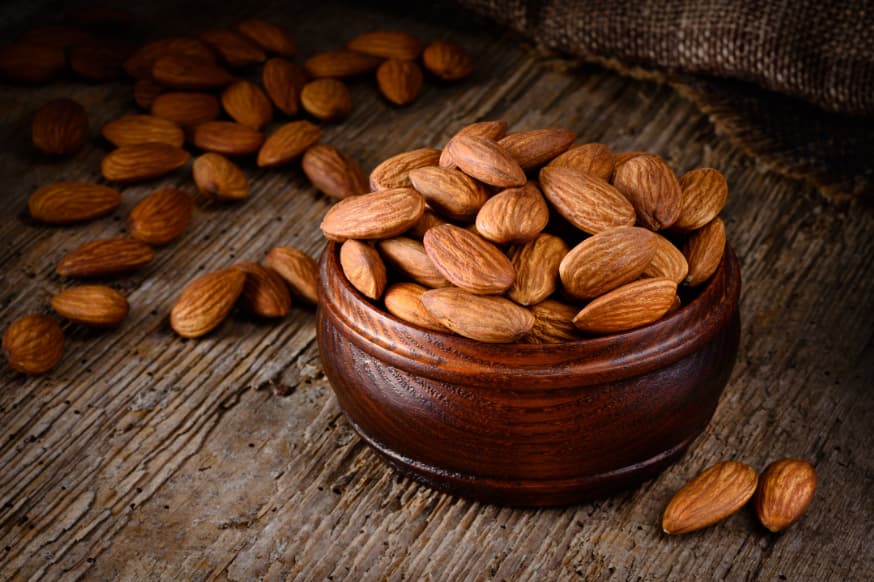
Almonds are excellent for gut health due to their high fibre content, which promotes regular bowel movements and serves as a prebiotic, nourishing beneficial gut bacteria. They also contain healthy fats, particularly monounsaturated fats, and antioxidants like vitamin E, which help protect the gut lining from oxidative damage. Almonds provide essential minerals, such as magnesium, which supports muscle function in the digestive tract and can ease digestion.
Typical Serving Size
- Serving size: 1 ounce (28 grams) of almonds (about 23 almonds)
Nutritional Values per Serving (28 grams of almonds)
- Calories: 161 kcal
- Protein: 6 grams
- Carbohydrates: 6 grams
- Sugars: 1.2 grams
- Fats: 14 grams
- Monounsaturated fats: 9 grams
Apples

Apples are a nutrient-dense fruit that is packed with fibre, vitamins, and antioxidants. They are known to support gut health, especially due to their content of prebiotic fibre like pectin, which feeds beneficial gut bacteria.
Typical Serving Size
- Serving size: 1 medium apple, 182 grams
Nutritional Values per Serving (182 grams of apple)
- Calories: 95 kcal
- Protein: 0.5 grams
- Carbohydrates: 25 grams
- Sugars: 19 grams (naturally occurring)
- Fats: 0.3 grams
Avocado
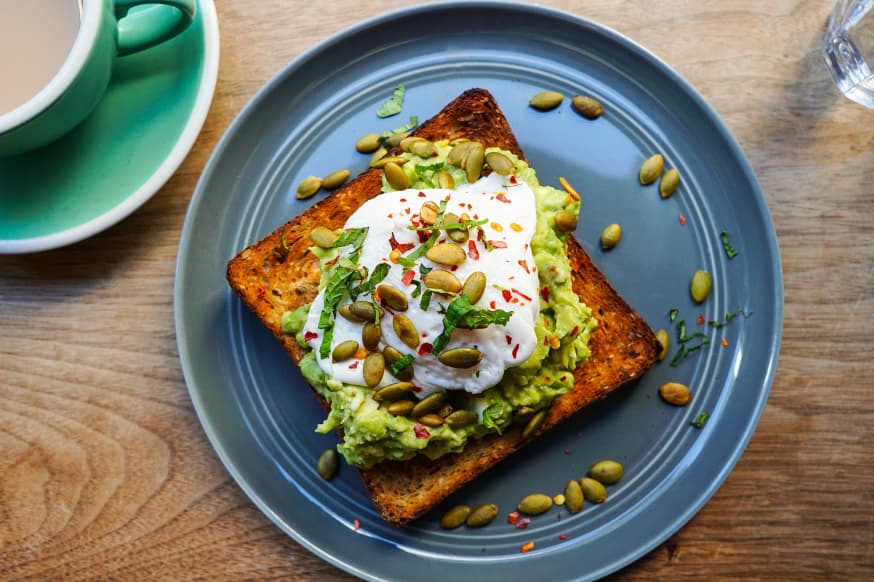
Avocado is excellent for gut health due to its high fibre content and healthy monounsaturated fats, which support digestion and help maintain a balanced gut microbiome. The fibre in avocado promotes regular bowel movements and acts as a prebiotic, feeding beneficial gut bacteria. Additionally, avocados are rich in potassium, which helps maintain electrolyte balance in the digestive tract, and contain anti-inflammatory compounds that protect the gut lining.
Typical Serving Size
-
- Serving size: 1/2 medium avocado (68 grams)
Nutritional Values per Serving (68 grams of avocado)
-
- Calories: 114 kcal
- Protein: 1.5 grams
- Carbohydrates: 6 grams
- Sugars: 0.2 grams
- Fats: 10.5 grams
- Monounsaturated fats: 6.7 grams
Banana

Bananas are particularly beneficial for gut health because they contain both soluble and insoluble fibre, which aid digestion and support regular bowel movements. They also provide prebiotics, specifically fructooligosaccharides (FOS), which feed beneficial gut bacteria and help balance the microbiome. Additionally, bananas are gentle on the stomach and can be helpful in soothing digestive discomfort. The natural sugars in bananas provide a quick energy source, while potassium supports hydration and electrolyte balance, both important for gut function.
Typical Serving Size
-
- Serving size: 1 medium banana (118 grams)
Nutritional Values per Serving (118 grams of banana)
-
- Calories: 105 kcal
- Protein: 1.3 grams
- Carbohydrates: 27 grams
- Sugars: 14 grams
- Fats: 0.3 grams
Barley
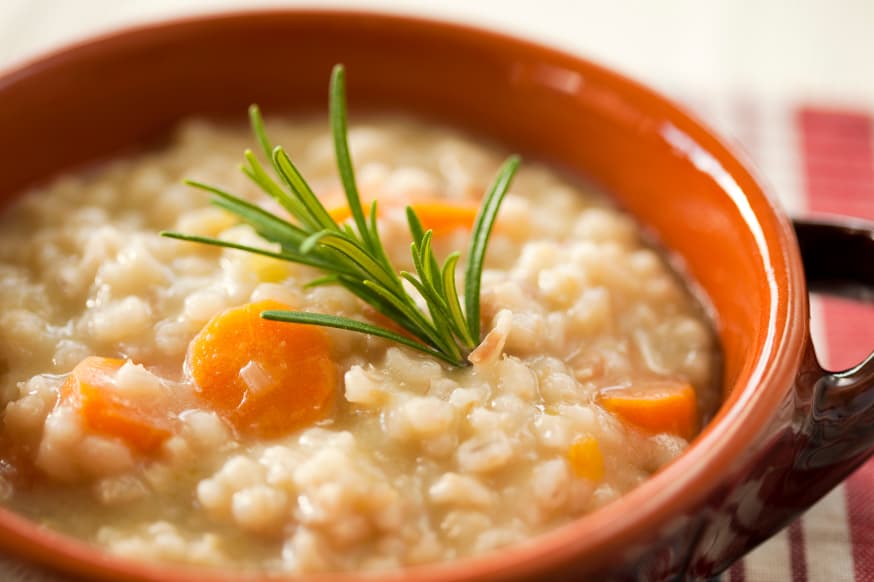
Barley is excellent for gut health, primarily due to its high beta-glucan fibre content, which has prebiotic effects that feed beneficial gut bacteria and promote a healthy microbiome. This soluble fibre also helps regulate digestion, improving stool consistency and supporting regular bowel movements. Barley has a low glycaemic index, making it a steady energy source, and its antioxidants help protect the gut lining from oxidative stress. Additionally, it contains vitamins and minerals like selenium, which further supports digestive and immune health.
Typical Serving Size
- Serving size: 1 cup (157 grams) of cooked barley
Nutritional Values per Serving (157 grams of cooked barley)
- Calories: 193 kcal
- Protein: 3.5 grams
- Carbohydrates: 44 grams
- Sugars: 0.4 grams
- Fats: 0.7 grams
Beans

Beans are highly beneficial for gut health due to their high fibre and resistant starch content, which act as prebiotics, feeding beneficial gut bacteria and supporting a healthy microbiome. Their insoluble fibre aids in regular digestion, while soluble fibre can help improve stool consistency. Beans are also an excellent source of plant-based protein and contain essential nutrients like iron, folate, and magnesium, which support overall digestive health and energy levels.
Typical Serving Size
- Serving size: 1 cup (172 grams) of cooked beans (e.g., black beans, kidney beans)
Nutritional Values per Serving (172 grams of cooked beans)
- Calories: 227 kcal
- Protein: 15.2 grams
- Carbohydrates: 40.4 grams
- Sugars: 0.6 grams
- Fats: 0.9 grams
Berries

Berries, such as strawberries, blueberries, raspberries, and blackberries, are fantastic for gut health. They are rich in fibre, particularly soluble fibre, which promotes a healthy balance of gut bacteria and supports regular digestion. Berries also contain polyphenols, powerful antioxidants that protect the gut lining and may reduce inflammation in the digestive tract. The natural sugars in berries are accompanied by a low glycaemic index, which means they provide a gentle energy release without causing blood sugar spikes.
Typical Serving Size
-
- Serving size: 1 cup (150 grams) of mixed berries
Nutritional Values per Serving (150 grams of mixed berries)
-
- Calories: 64 kcal
- Protein: 1.5 grams
- Carbohydrates: 14.5 grams
- Sugars: 9.4 grams
- Fats: 0.5 grams
Bone Broth

Bone broth is beneficial for gut health due to its high content of collagen, amino acids like glutamine, and minerals. Glutamine supports the integrity of the gut lining, reducing the risk of leaky gut, and collagen may help strengthen and repair the digestive tract lining. Bone broth also contains easily digestible nutrients, such as calcium, magnesium, and phosphorus, which support digestive health. Additionally, its soothing, hydrating properties can ease digestive discomfort and support overall gut health.
Typical Serving Size
- Serving size: 1 cup (240 ml) of bone broth
Nutritional Values per Serving (240 ml of bone broth)
- Calories: 35 kcal
- Protein: 6 grams
- Carbohydrates: 0 grams
- Sugars: 0 grams
- Fats: 0.5 grams
Brown Rice

Brown rice is highly beneficial for gut health due to its high fibre content, especially insoluble fibre, which promotes regular bowel movements and acts as a prebiotic, nourishing beneficial gut bacteria. Unlike white rice, brown rice retains its bran and germ, which are packed with vitamins, minerals, and antioxidants that support overall digestive health. It also provides a slow-release source of energy, which is easier on blood sugar levels, making it ideal for a balanced diet.
Typical Serving Size
- Serving size: 1 cup (195 grams) of cooked brown rice
Nutritional Values per Serving (195 grams of cooked brown rice)
- Calories: 216 kcal
- Protein: 5 grams
- Carbohydrates: 45 grams
- Sugars: 0.7 grams
- Fats: 1.8 grams
Brussels Sprouts

Brussels sprouts are excellent for gut health due to their high fibre content and the presence of glucosinolates, compounds known to support a healthy gut lining and help reduce inflammation. The fibre in Brussels sprouts encourages regular bowel movements and helps maintain a balanced gut microbiome. Additionally, they are rich in antioxidants and vitamin C, which support immune function and protect the digestive system from oxidative stress.
Typical Serving Size
- Serving size: 1 cup (88 grams) of raw Brussels sprouts
Nutritional Values per Serving (88 grams of raw Brussels sprouts)
- Calories: 38 kcal
- Protein: 3 grams
- Carbohydrates: 7.9 grams
- Sugars: 1.9 grams
- Fats: 0.3 grams
Carrots

Carrots are beneficial for gut health due to their high fibre content, which supports regular digestion and promotes the growth of healthy gut bacteria. They are particularly rich in soluble fibre, which helps to feed beneficial bacteria and can improve stool consistency. Additionally, carrots contain beta-carotene, an antioxidant that supports a healthy immune response in the gut lining. Carrots’ natural sugars also make them an easily digestible energy source without overwhelming the digestive system.
Typical Serving Size
- Serving size: 1 medium carrot (61 grams)
Nutritional Values per Serving (61 grams of raw carrot)
- Calories: 25 kcal
- Protein: 0.6 grams
- Carbohydrates: 5.8 grams
- Sugars: 2.9 grams
- Fats: 0.1 grams
Chia Seeds
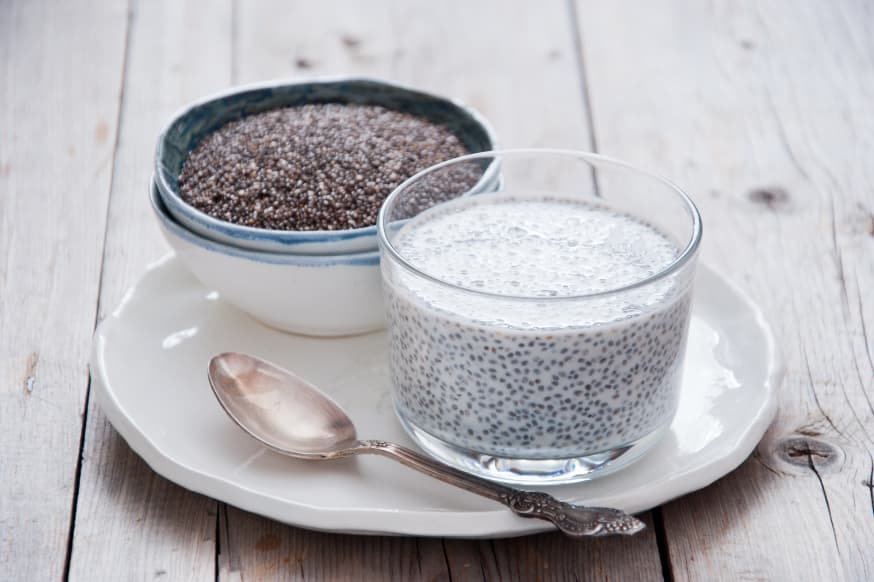
Chia seeds are tiny but nutrient packed. These seeds are rich in fiber and a great source of healthy fats, protein, and various essential micronutrients. They promote healthy digestion and regular bowel movements by forming a gel-like consistency when soaked, which can soothe the gut lining and reduce inflammation.
Typical Serving Size
- Serving size: 1 ounce (28 grams)
Nutritional Values per Serving (28 grams of raw chia seeds)
- Calories: ~138 kcal
- Protein: ~4.7 g
- Carbohydrates: ~12 g
- Sugars: ~0 g (naturally sugar-free)
- Fat: ~8.6 g
Dark Chocolate
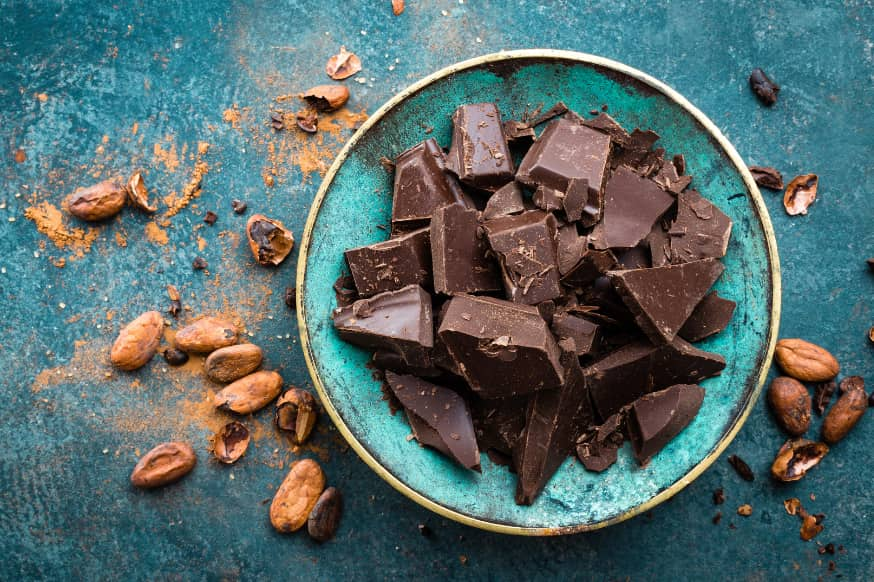
Dark chocolate, particularly varieties with a high cocoa content (70% or higher), is beneficial for gut health due to its high polyphenol content, which acts as a prebiotic to support beneficial gut bacteria, like Lactobacillus and Bifidobacterium. These polyphenols have antioxidant and anti-inflammatory properties that help protect the gut lining. Additionally, dark chocolate may improve mood through its positive effects on serotonin, which also plays a role in gut function and the gut-brain axis.
Typical Serving Size
- Serving size: 1 ounce (28 grams) of dark chocolate (70-85% cocoa)
Nutritional Values per Serving (28 grams of dark chocolate)
- Calories: 170 kcal
- Protein: 2 grams
- Carbohydrates: 13 grams
- Sugars: 7 grams
- Fats: 12 grams
- Saturated fats: 7 grams
Flaxseeds

Flaxseeds are excellent for gut health due to their high fibre content, which promotes regular bowel movements and acts as a prebiotic, nourishing beneficial gut bacteria. They also contain lignans, which have antioxidant properties that help protect the gut lining. Flaxseeds are a rich source of omega-3 fatty acids, particularly alpha-linolenic acid (ALA), which helps reduce inflammation in the digestive tract. Additionally, they can help ease digestion and support a balanced microbiome.
Typical Serving Size
-
- Serving size: 1 tablespoon (10 grams) of ground flaxseeds
Nutritional Values per Serving (10 grams of ground flaxseeds)
-
- Calories: 55 kcal
- Protein: 1.9 grams
- Carbohydrates: 3 grams
- Sugars: 0.2 grams
- Fats: 4.3 grams
- Omega-3 fatty acids (ALA): 2.3 grams
Garlic

Rich in prebiotic fibers, garlic encourages the growth of good bacteria while reducing the growth of harmful bacteria in the gut. It also has natural antibacterial properties that can help keep the gut healthy.
Typical Serving Size
-
- Serving size: 3 cloves (9 grams)
Nutritional Values per Serving (9 grams of raw garlic)
- Calories: ~13 kcal
- Protein: ~0.6 g
- Carbohydrates: ~3 g
- Sugars: ~0.1 g
- Fat: ~0.1 g
Ginger

Known for its anti-inflammatory properties, ginger can help soothe digestive issues, reduce bloating, and promote the growth of healthy gut bacteria.
Typical Serving Size
-
- Serving size: 1 tablespoon (6 grams)
Nutritional Values per Serving (6 grams of raw ginger)
- Calories: ~5 kcal
- Protein: ~0.1 g
- Carbohydrates: ~1.1 g
- Sugars: ~0 g (contains natural sugars but in negligible amounts)
- Fat: ~0.05 g
Green Tea

Green tea is beneficial for gut health due to its high content of polyphenols, particularly catechins like epigallocatechin gallate (EGCG), which have antioxidant and anti-inflammatory properties that support a healthy gut lining. These polyphenols act as prebiotics, encouraging the growth of beneficial bacteria and inhibiting harmful bacteria. Additionally, green tea may aid digestion by reducing bloating and soothing the digestive tract, promoting a balanced microbiome and overall digestive wellness.
Typical Serving Size
- Serving size: 1 cup (240 ml) of brewed green tea
Nutritional Values per Serving (240 ml of brewed green tea)
- Calories: 2 kcal
- Protein: 0 grams
- Carbohydrates: 0 grams
- Sugars: 0 grams
- Fats: 0 grams
Kale
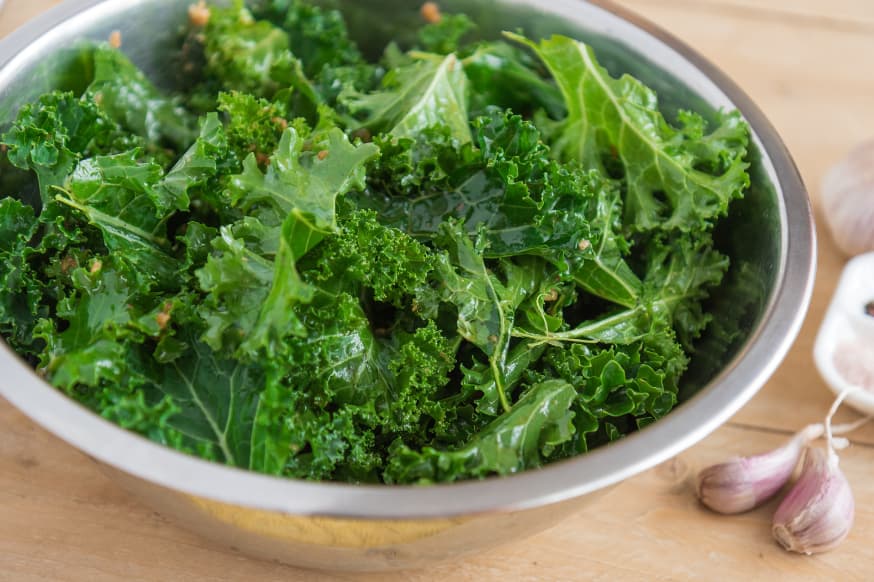
Kale is a powerhouse for gut health, packed with fibre, antioxidants, and anti-inflammatory compounds. Its high fibre content aids digestion and helps maintain a healthy balance of gut bacteria. Kale also contains glucosinolates, which, when broken down, can support the gut lining and reduce the risk of certain gastrointestinal issues. Rich in vitamins C and K, kale contributes to overall gut and immune health, which is essential for protecting against harmful bacteria.
Typical Serving Size
- Serving size: 1 cup (67 grams) of raw kale
Nutritional Values per Serving (67 grams of raw kale)
- Calories: 33 kcal
- Protein: 2.9 grams
- Carbohydrates: 6.7 grams
- Sugars: 1.3 grams
- Fats: 0.6 grams
Kombucha

Kombucha is beneficial for gut health due to its probiotic content, derived from the fermentation process, which helps support a balanced gut microbiome by adding beneficial bacteria. These probiotics can improve digestion, reduce bloating, and support the immune system. Kombucha also contains organic acids, such as acetic and gluconic acids, which can inhibit the growth of harmful bacteria in the gut. Additionally, it has antioxidants from the tea used in fermentation, which help protect the gut lining from oxidative damage.
Typical Serving Size
-
- Serving size: 1 cup (240 ml) of kombucha
Nutritional Values per Serving (240 ml of kombucha)
-
- Calories: 30 kcal
- Protein: 0 grams
- Carbohydrates: 7 grams
- Sugars: 2-6 grams (varies depending on brand and fermentation length)
- Fats: 0 grams
Kefir

Kefir is highly beneficial for gut health because it is rich in probiotics, beneficial bacteria that help balance the gut microbiome, aiding in digestion and immune function. The unique strains of probiotics in kefir, such as Lactobacillus and Bifidobacterium, can colonise the gut more effectively than other fermented foods, promoting a healthy digestive system. Additionally, kefir is a good source of calcium, protein, and B vitamins, supporting both gut and overall health.
Typical Serving Size
-
- Serving size: 1 cup (240 ml) of plain kefir
Nutritional Values per Serving (240 ml of plain kefir)
-
- Calories: 104 kcal
- Protein: 9 grams
- Carbohydrates: 7.8 grams
- Sugars: 7.8 grams
- Fats: 2.5 grams
Kimchi

Kimchi is a fantastic food for gut health due to its high probiotic content, which comes from the fermentation process. These probiotics help balance the gut microbiome, aiding digestion and supporting immune function. Kimchi is also rich in fibre, vitamins, and antioxidants, especially vitamin C and beta-carotene, which protect the gut lining and reduce inflammation. The presence of lactic acid bacteria in kimchi aids in breaking down food in the digestive tract, making it easier to absorb nutrients.
Typical Serving Size
- Serving size: 1 cup (150 grams) of kimchi
Nutritional Values per Serving (150 grams of kimchi)
- Calories: 23 kcal
- Protein: 1.7 grams
- Carbohydrates: 4 grams
- Sugars: 2 grams
- Fats: 0.5 grams
Lentils
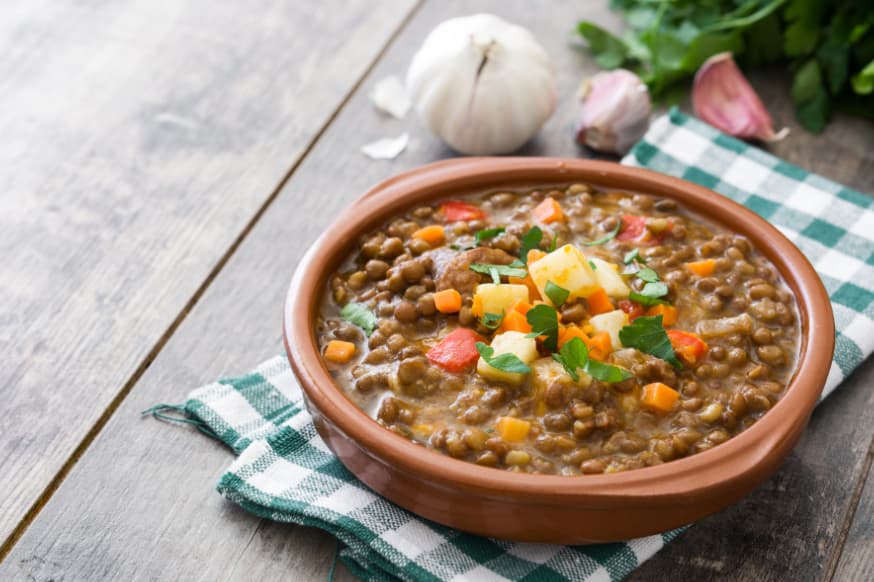
Lentils are excellent for gut health due to their high fibre content, which promotes regular bowel movements and helps feed beneficial gut bacteria, acting as a prebiotic. They also contain resistant starch, which passes through the digestive tract largely undigested, supporting gut health by encouraging the growth of healthy bacteria in the colon. Additionally, lentils are rich in protein, iron, and B vitamins, which aid in overall digestive function and support energy metabolism.
Typical Serving Size
- Serving size: 1 cup (198 grams) of cooked lentils
Nutritional Values per Serving (198 grams of cooked lentils)
- Calories: 230 kcal
- Protein: 18 grams
- Carbohydrates: 39.9 grams
- Sugars: 3.6 grams
- Fats: 0.8 grams
Miso

Miso is excellent for gut health because it is a fermented food rich in probiotics, specifically beneficial strains like Lactobacillus. These probiotics support a balanced gut microbiome, aid digestion, and enhance nutrient absorption. Miso is also rich in antioxidants and essential minerals such as zinc, manganese, and copper, which support immune health and protect the gut lining from inflammation. Additionally, its umami flavour makes it a versatile ingredient for adding depth to dishes without needing much salt.
Typical Serving Size
- Serving size: 1 tablespoon (17 grams) of miso paste
Nutritional Values per Serving (17 grams of miso paste)
- Calories: 33 kcal
- Protein: 2.2 grams
- Carbohydrates: 4.3 grams
- Sugars: 1.1 grams
Oats
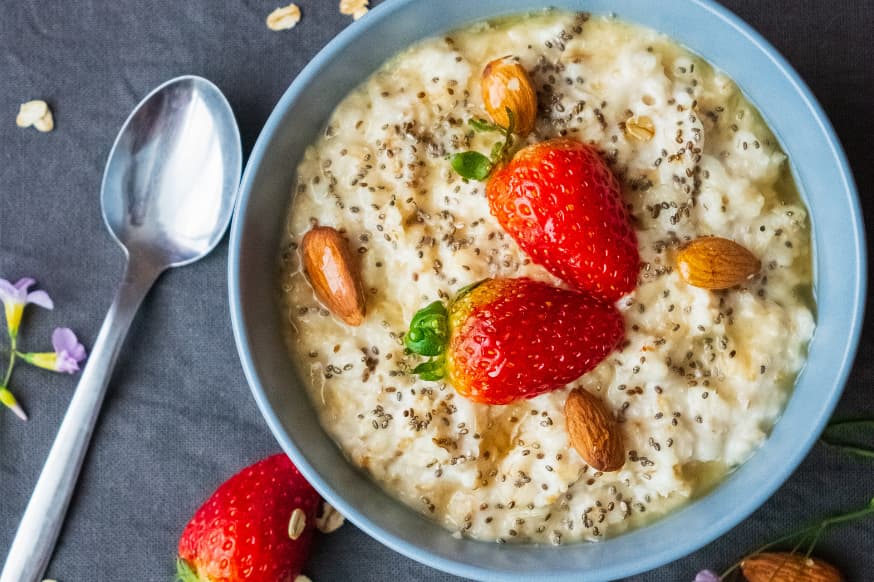
Oats are a great choice for gut health due to their high content of both soluble and insoluble fibre, particularly beta-glucan, which helps feed beneficial gut bacteria and supports healthy digestion. Beta-glucan also helps regulate bowel movements, making oats a gentle but effective aid for digestive regularity. Additionally, oats have a low glycaemic index, which means they provide long-lasting energy without causing blood sugar spikes. Rich in vitamins, minerals, and antioxidants, oats contribute to a balanced diet and overall gut health.
Typical Serving Size
- Serving size: 1 cup (81 grams) of cooked oats
Nutritional Values per Serving (81 grams of cooked oats)
-
- Calories: 154 kcal
- Protein: 6 grams
- Carbohydrates: 27 grams
- Sugars: 0.4 grams
- Fats: 3.2 grams
Olive Oil

Olive oil is beneficial for gut health due to its healthy monounsaturated fats and polyphenols, which have anti-inflammatory and antioxidant properties that protect the gut lining. It also encourages the growth of beneficial bacteria, particularly Lactobacillus and Bifidobacterium, which support a balanced microbiome. Olive oil’s anti-inflammatory properties can help reduce gastrointestinal inflammation, while its mild laxative effect can aid in regular digestion without irritation.
Typical Serving Size
- Serving size: 1 tablespoon (15 ml) of olive oil
Nutritional Values per Serving (15 ml of olive oil)
- Calories: 119 kcal
- Protein: 0 grams
- Carbohydrates: 0 grams
- Sugars: 0 grams
- Fats: 13.5 grams
- Monounsaturated fats: 9.8 grams
Quinoa
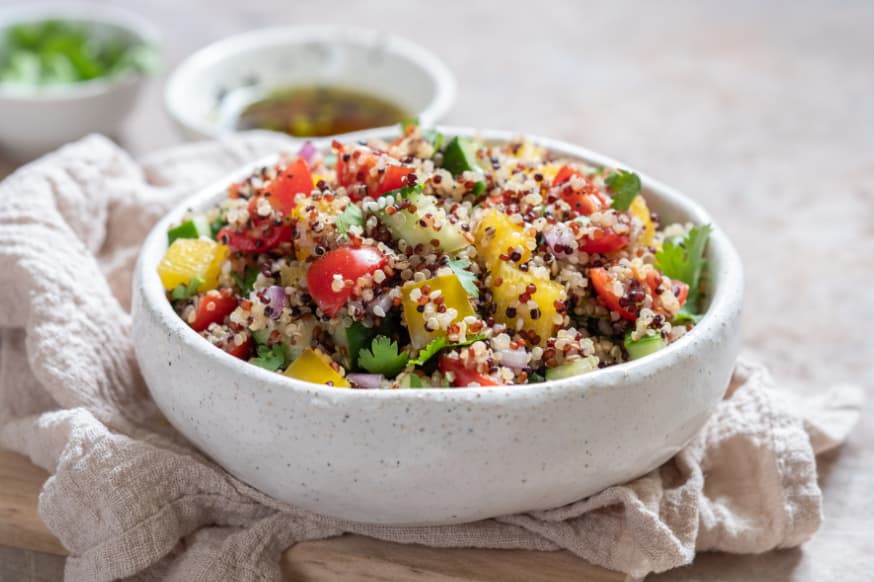
Quinoa is highly beneficial for gut health due to its high fibre content and complete protein profile, containing all nine essential amino acids, which supports muscle recovery and gut lining health. Its insoluble fibre aids digestion and encourages the growth of beneficial gut bacteria, contributing to a balanced microbiome. Quinoa is also a source of prebiotics, which help feed these bacteria, promoting optimal gut health. Additionally, it is rich in magnesium, manganese, and antioxidants that support digestive and overall health.
Typical Serving Size
- Serving size: 1 cup (185 grams) of cooked quinoa
Nutritional Values per Serving (185 grams of cooked quinoa)
- Calories: 222 kcal
- Protein: 8 grams
- Carbohydrates: 39 grams
- Sugars: 1.6 grams
- Fats: 3.6 grams
Red Grapes

Red grapes are beneficial for gut health due to their high fibre and polyphenol content, particularly resveratrol, which has antioxidant and anti-inflammatory properties that help protect the gut lining. The polyphenols in red grapes act as prebiotics, promoting the growth of beneficial gut bacteria. Additionally, their natural sugars are balanced by fibre, which aids digestion and helps prevent blood sugar spikes. Red grapes also contain water, which supports hydration and healthy digestion.
Typical Serving Size
-
- Serving size: 1 cup (151 grams) of red grapes
Nutritional Values per Serving (151 grams of red grapes)
-
- Calories: 104 kcal
- Protein: 1.1 grams
- Carbohydrates: 27 grams
- Sugars: 23 grams
- Fats: 0.2 grams
Sauerkraut
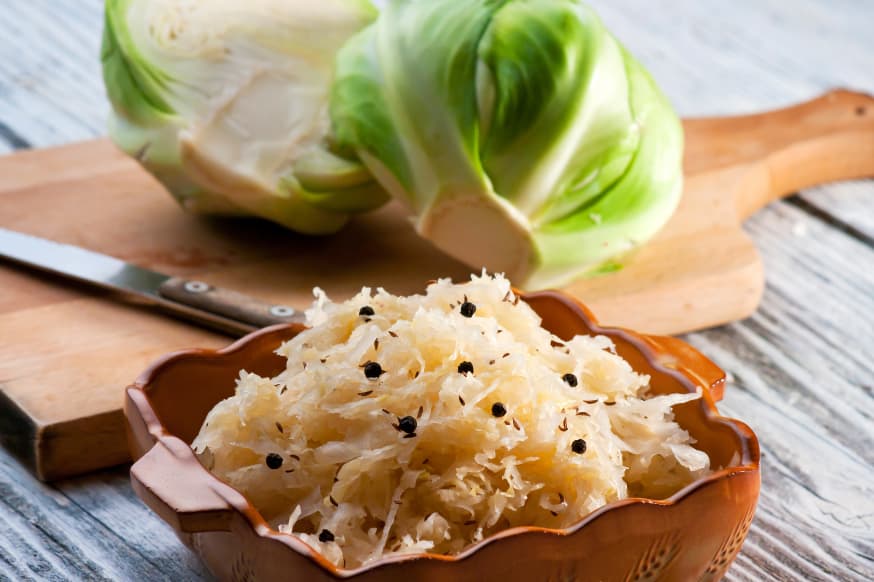
Fermented cabbage like sauerkraut is loaded with probiotics, fibre, and vitamins. It supports the growth of good bacteria and helps reduce gut inflammation. This also applies to all fermented foods like Kimchi (a spicy, fermented Korean dish made with vegetables like cabbage and radishes), Kefir (fermented milk drink) and Miso (traditional Japanese seasoning made from fermented soybeans).
Typical Serving Size
-
- Serving size: 1 cup (151 grams) of sauerkraut
Nutritional Values per Serving (151 grams of sauerkraut)
-
- Calories: ~27 kcal
- Protein: ~1.3 g
- Carbohydrates: ~6 g
- Sugars: ~3 g (naturally occurring from the cabbage)
- Fat: ~0.2 g
Spinach

Spinach is an excellent ingredient for gut health, primarily due to its high fibre content, which helps promote regular bowel movements and supports beneficial gut bacteria. Additionally, spinach contains a unique type of sugar called sulfoquinovose, which encourages the growth of beneficial bacteria in the gut and may help reduce inflammation. Its rich antioxidant profile, including vitamins A and C, also helps protect the gut lining from oxidative stress.
Typical Serving Size
- Serving size: 1 cup (30 grams) of raw spinach
Nutritional Values per Serving (30 grams of raw spinach)
- Calories: 7 kcal
- Protein: 0.9 grams
- Carbohydrates: 1.1 grams
- Sugars: 0.1 grams
- Fats: 0.1 grams
Walnuts
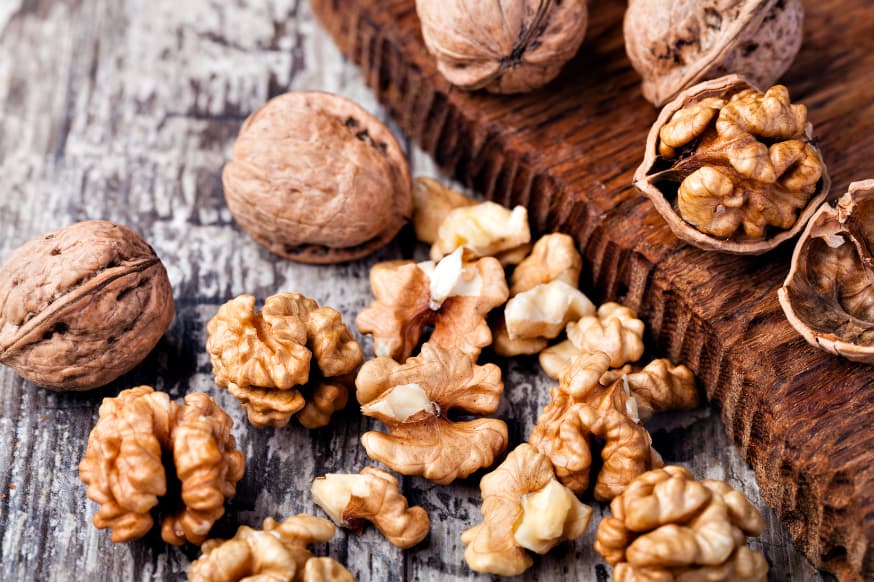
Walnuts are highly beneficial for gut health due to their fibre and rich polyunsaturated fat content, particularly alpha-linolenic acid (ALA), an omega-3 fatty acid. Walnuts act as a prebiotic, promoting the growth of beneficial bacteria in the gut, which helps maintain a balanced microbiome. Their high antioxidant content also protects the gut lining from oxidative stress. Additionally, the healthy fats in walnuts support digestion and reduce inflammation in the digestive tract.
Typical Serving Size
- Serving size: 1 ounce (28 grams) of walnuts (about 14 halves)
Nutritional Values per Serving (28 grams of walnuts)
- Calories: 185 kcal
- Protein: 4.3 grams
- Carbohydrates: 3.9 grams
- Sugars: 0.7 grams
- Fats: 18.5 grams
- Polyunsaturated fats: 13.2 grams
Yoghurt
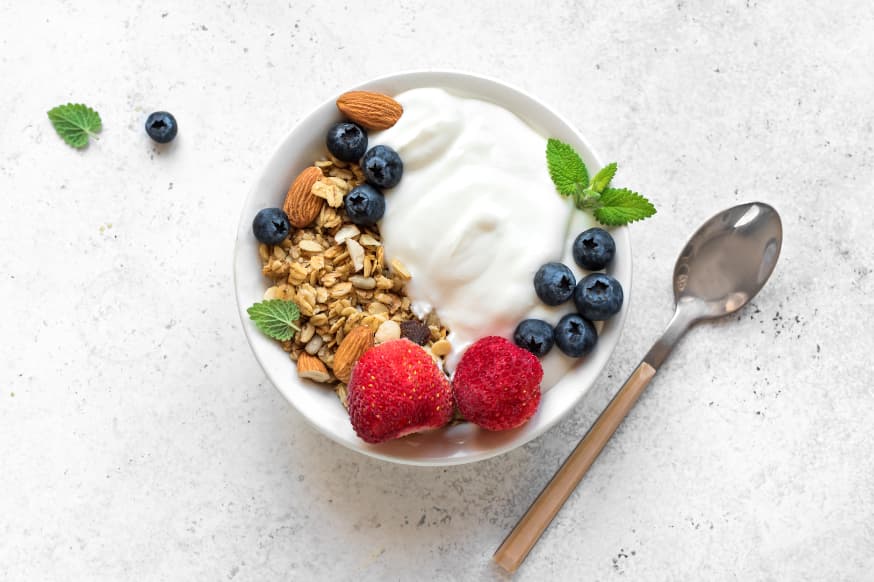
Yoghurt with live and active cultures contains beneficial bacteria like Lactobacillus and Bifidobacterium, which support gut health. Fermentation reduces lactose content, making yoghurt more digestible for those with lactose sensitivity.
Typical Serving Size
- Serving size: 1 cup (245 grams) of yoghurt
Nutritional Values per Serving (28 grams of walnuts)
- Calories: ~200 kcal
- Protein: ~20 g
- Carbohydrates: ~8 g
- Sugars: ~6 g (naturally occurring lactose)
- Fat: ~10 g
Kcal Meal Plans are packed with foods to improve your gut health. Subscribing to a personalised meal plan will completely repair your gut health and help you manage your weight at the same time! Customers can lose between 2-3 kg per month and feel fantastic because they are fuelled with nutritious and gut-healthy food to transform their bodies from the inside to the outside.







